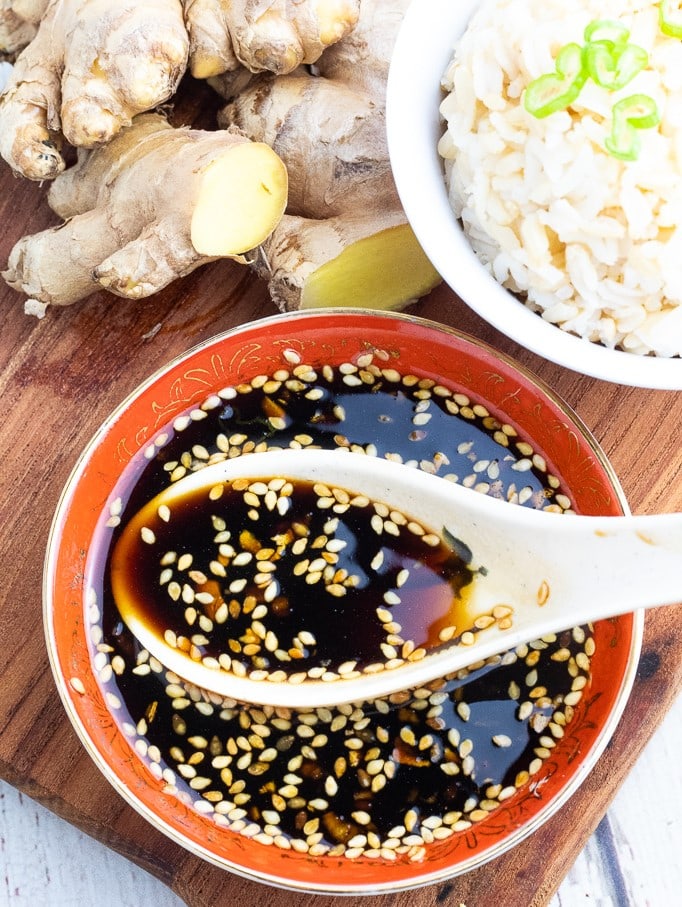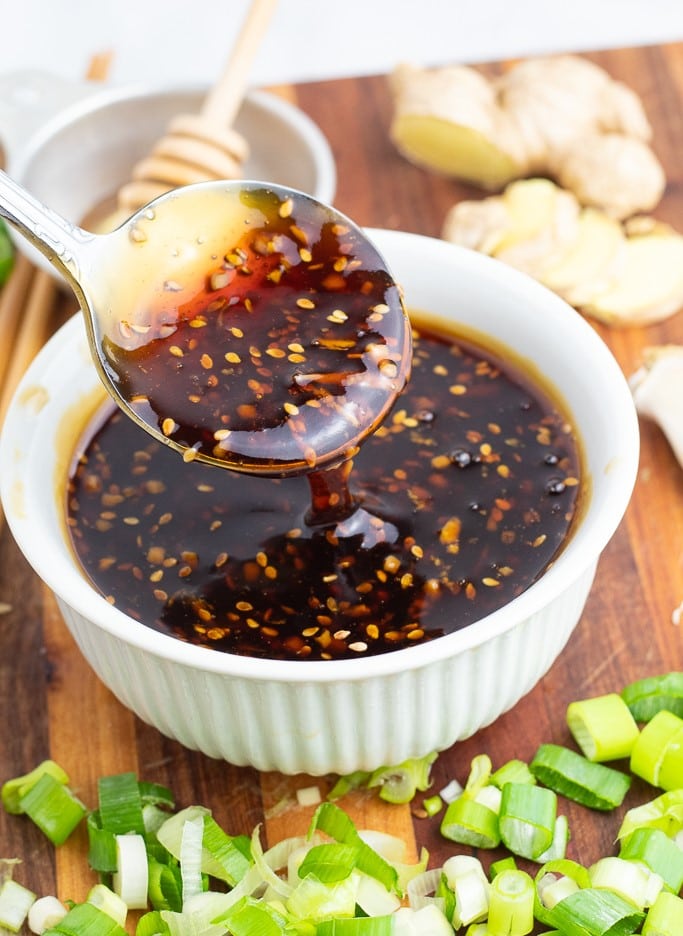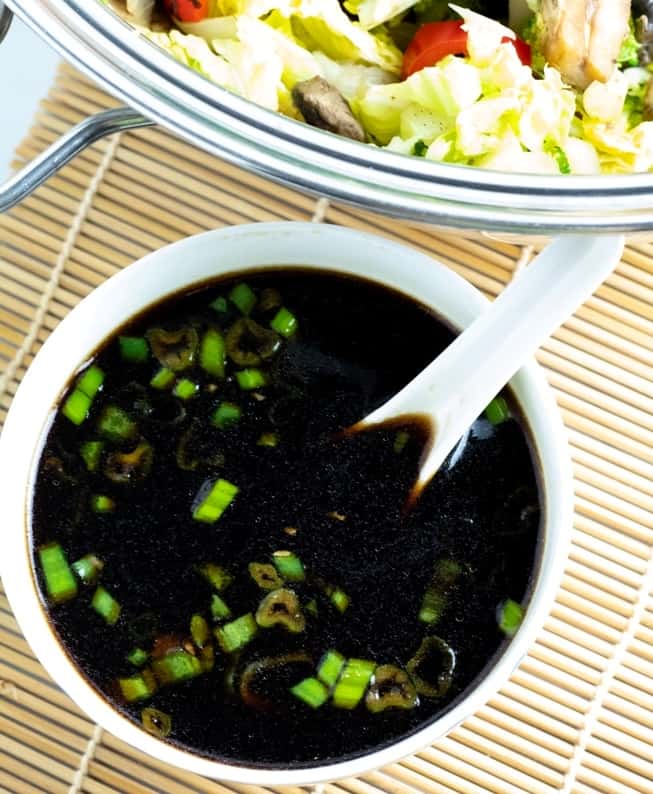Easy Umami Sauce
Try this Umami Sauce Recipe for boosting flavor in sautés and stir-fries without adding all the sodium of soy sauce. It’s made with a blend of miso, ginger, molasses, and other spices, and it has the most delicious savory flavor.

This delicious seasoning is completely salt-free, oil-free, vegan, and gluten-free. It’s hard to believe, but it can amplify the taste of so many recipes and keep them healthy! If you love umami flavor, try my easy 5-minute miso sauce too because it’s good on everything!
This umami seasoning recipe was created by Dr. Michael Greger, MD with NutritionFacts.org. He has many more herb seasonings and recipes in his book, How Not to Die Cookbook.
If you are new to cooking or just plant-based cooking in general this list of Top 15 Herbs & Spices can help you create the best flavors with all your meals.
Reasons you will love this sauce
- Bursting with Umami Flavor – This simple sauce is packed with rich, savory umami flavors, adding depth to your meals without the need for oil.
- Vegan & Gluten-Free – Perfect for those with dietary restrictions, this sauce caters to both vegan and gluten-free diets, offering a versatile condiment for everyone.
- Healthy & Oil-Free – Enjoy the deliciousness guilt-free! This sauce is oil-free, making it a heart-healthy option without sacrificing taste.
- Quick & Easy to Make – With just a few simple ingredients, this umami sauce comes together in minutes, making it a convenient addition to any meal.
What is umami?
Umami is one of the five basic tastes, even though many people are only learning about it in the last few years. Most of us are familiar with the other four–sweet, sour, salty, and bitter. Umami is a savory flavor that is part of many Asian plant-based dishes.
The word ‘umami’ was created by a Japanese chemist named Kikunae Ikeda from umami, which means “delicious,” and mi, which means “taste.” The perfect name, as it is a delicious taste!
Umami sauce flavor
Umami sauce has a true savory flavor and has been described as having a brothy taste. Some foods that have high levels of the amino acid glutamate such as mushrooms, miso, seaweed, and even parmesan cheese have an umami flavor.
Ingredients you will need
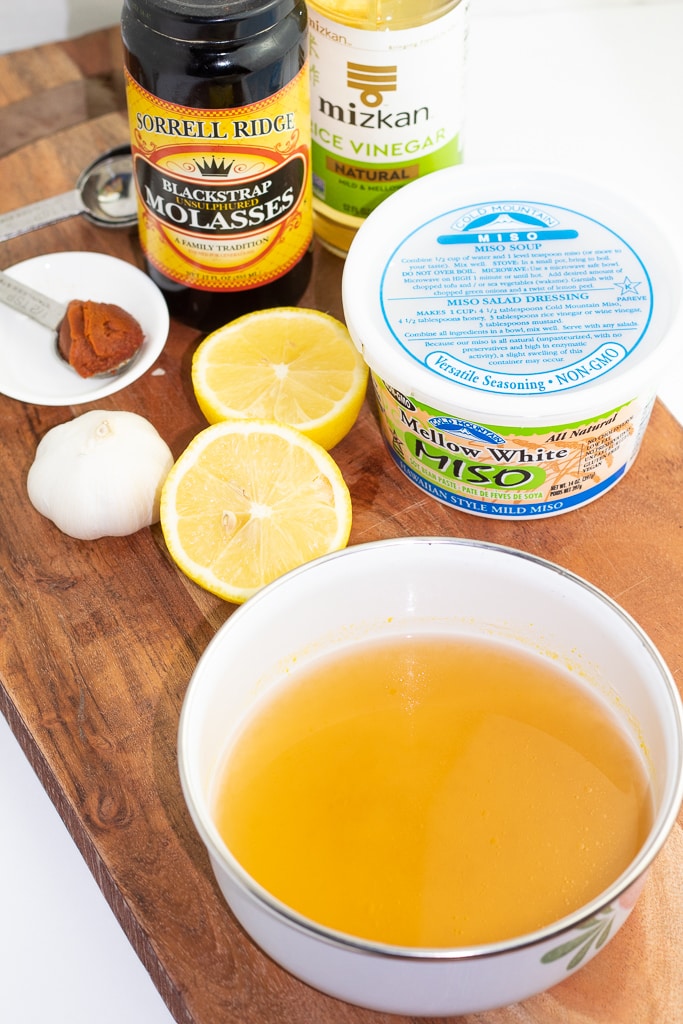
- Vegetable broth- It adds depth and a savory base without the need for oil. It enhances the sauce with natural flavors from vegetables, making the sauce rich and satisfying while keeping it light and plant-based.
- Garlic- Adds a robust, savory flavor that enhances the overall richness of the sauce. Its natural aromatic compounds deepen the umami profile, making the sauce more flavorful and complex.
- Ginger- Its zesty, aromatic qualities bring freshness and depth, enhancing the overall complexity of the umami taste.
- Blackstrap molasses- Provides a deep, rich sweetness with a hint of bitterness, which enhances the savory, umami flavors. Its thick texture also adds body to the sauce, while offering extra nutrients like iron and calcium, making the sauce both flavorful and nutritious.
- Date syrup or date sugar- Has a natural, caramel-like sweetness that balances the savory and salty elements. Their rich, dense texture also helps thicken the sauce without the need for processed sugars, keeping it wholesome and nutrient-rich.
- Tomato paste- Creates a concentrated, savory flavor that’s naturally rich in umami. It adds depth, tanginess, and a slightly sweet note, enhancing the overall complexity and making the sauce more robust and flavorful.
- White miso paste- Delivers a mild, savory flavor that’s rich in natural umami. Its fermented qualities add depth and complexity, while also contributing a touch of sweetness, making the sauce more balanced and versatile.
- Lemon- Its bright acidity balances the rich, savory flavors, adding a fresh, tangy note.
- Rice vinegar- Its mild acidity adds a subtle tang that balances the rich, savory flavors. It enhances the overall depth without overpowering the other ingredients, providing a smooth, well-rounded taste with a slight sweetness typical of rice vinegar.
How to make umami sauce
The recipe card at the bottom of the page has the full list of ingredients with measurements and instructions.

STEP #1: In a small bowl, whisk together 1.5 teaspoons of white miso paste with 2 tablespoons of veggie broth or water. Whisk until smooth and set it to the side.
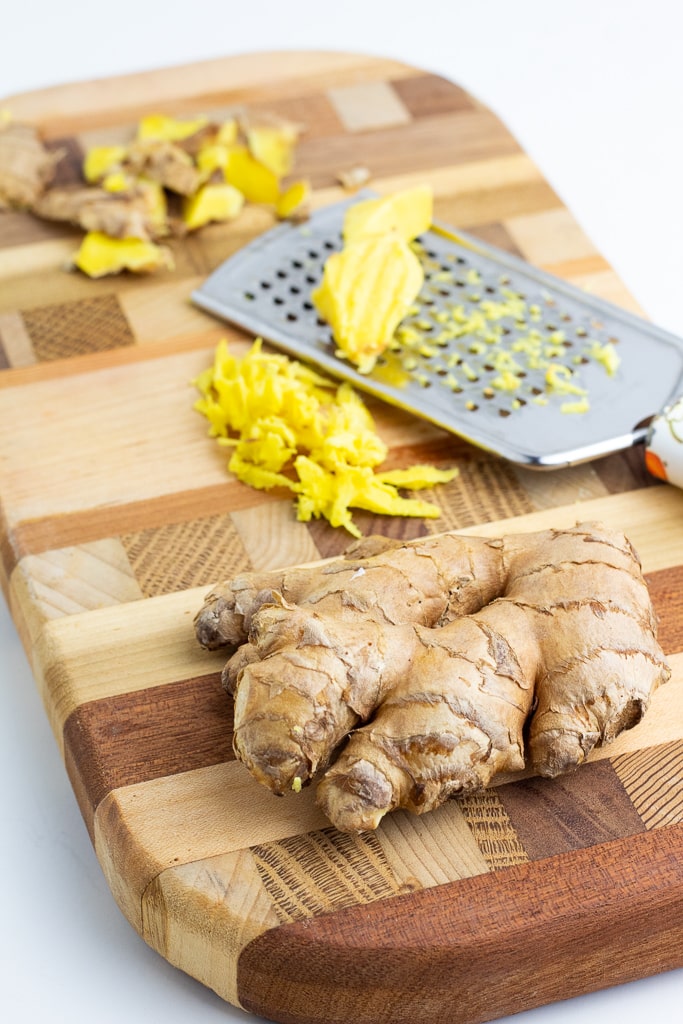
STEP #2: To mince garlic, peel the cloves and finely chop them with a knife, or use a garlic press for a quicker option.
For grating ginger, peel the skin using a spoon or peeler, then use a grater to create fine shreds, releasing its aromatic juices for your sauce.
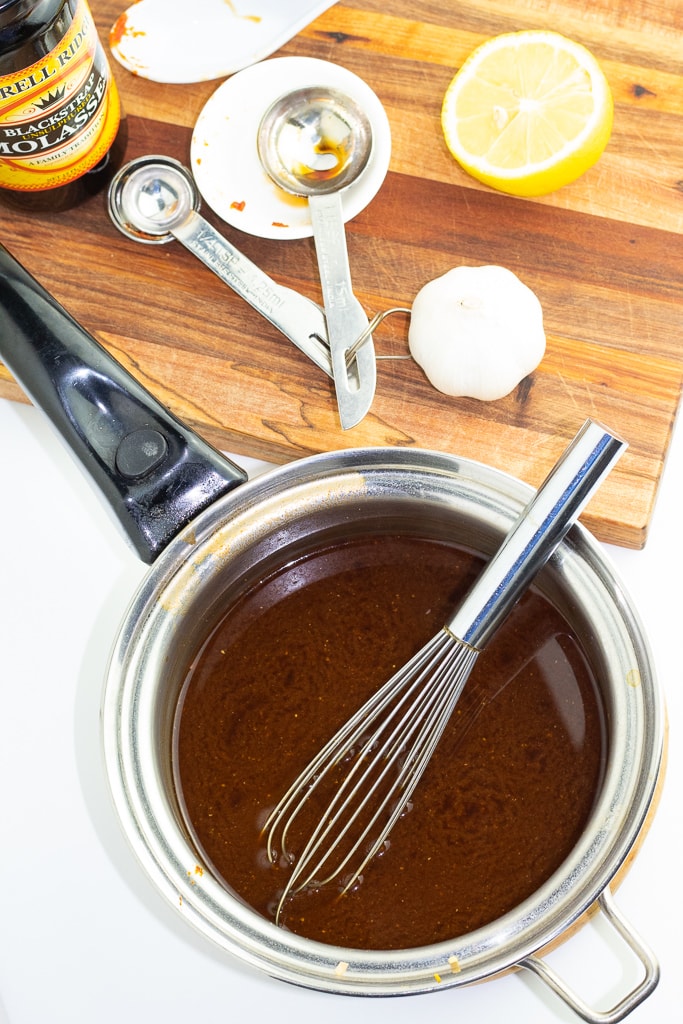
STEP #3: Heat the broth in a small saucepan over medium heat. Add the garlic and ginger and simmer for 3 minutes.
Stir in the molasses, date syrup or date sugar, tomato paste, and black pepper, and bring to a boil. Reduce the heat to low and simmer for 1 minute.
Remove from the heat and then stir in the miso mixture, blended lemon (or lemon juice), and rice vinegar.
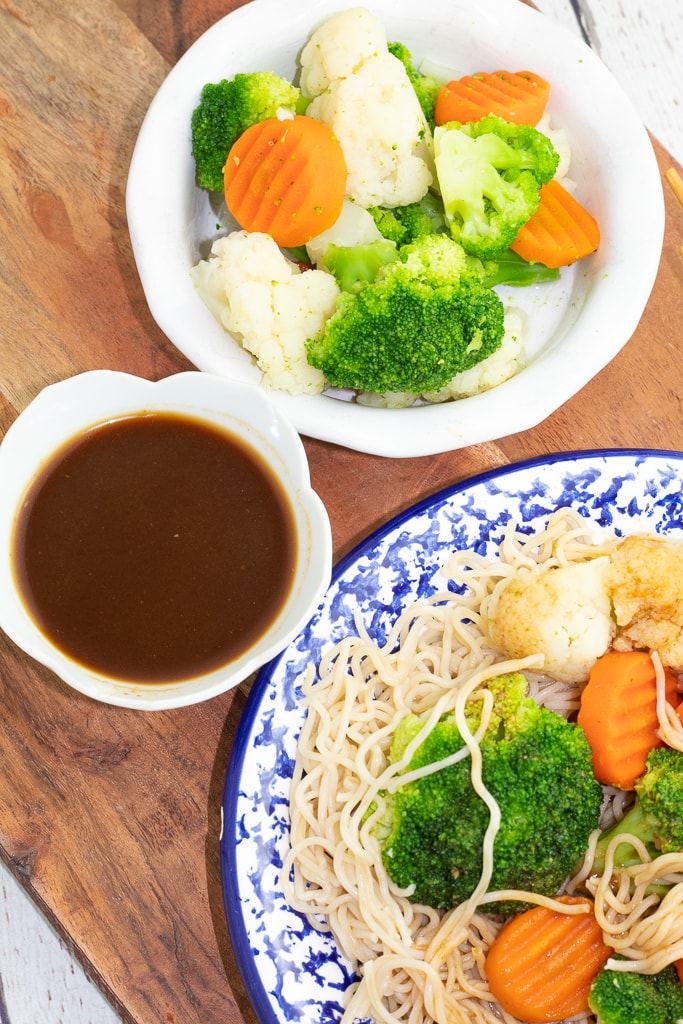
STEP #4: Taste and adjust the seasonings if needed. Allow the sauce to cool and use it on veggies, in stir-fries, or tofu dishes.
Transfer leftovers to a jar or bottle with a tight-fitting lid. Another option is to pour the sauce into an ice cube tray and freeze it into individual portions that equal approximately 1 tablespoon.
Excerpted from the HOW NOT TO DIE COOKBOOK by Michael Greger, M.D. with Gene Stone. Copyright © 2017 by Michael Greger with Gene Stone. Reprinted with permission from Flatiron Books. All rights reserved. Recipes by Robin Robertson.
Frequently Asked Questions
Yes! Feel free to tweak the ingredients to suit your taste. You can add more garlic or ginger for an extra kick, adjust the sweetness with more dates or molasses, or add other spices and herbs for added depth.
Umami sauce is versatile and can be used as a marinade, dressing, or dip. It pairs well with vegetables, grains, and tofu, and is a flavor enhancer in soups and stir-fries. Umami sauce can be used in many dishes like this Udon Noodle Stir-Fry to replace soy sauce and salt.
Yes, while miso adds a distinct umami flavor, you can substitute it with additional tomato paste or nutritional yeast to maintain a savory profile. However, the flavor will differ slightly.
Store the sauce in an airtight container in the refrigerator, where it will last for up to a week. You can also freeze it in portions for longer storage, up to three months.
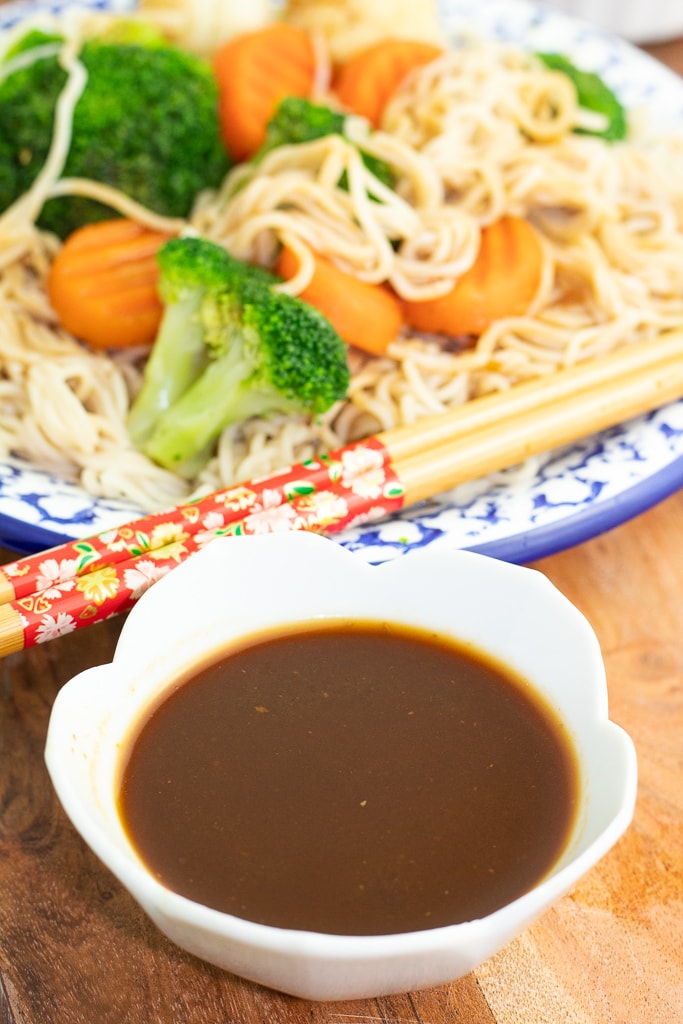
For those of you new to the whole food plant-based lifestyle, we’ve created a FREE 7-Day Plant-Based Menu Planner to help you get started!
If you try this recipe, please let us know how you like it by rating it and leaving a comment. We love to hear from you!
Want to Save This Recipe?
Enter your email & I’ll send it to your inbox. Plus, get great new recipes from me every week!
By submitting this form, you consent to receive emails from EatPlant-Based
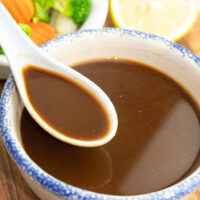
Umami Sauce Recipe
Ingredients
- 1 cup vegetable broth
- 1 teaspoon minced garlic
- 1 teaspoon grated fresh ginger
- 1 tablespoon blackstrap molasses
- 1.5 teaspoons date syrup or date sugar
- 1/2 teaspoon tomato paste
- 1/2 teaspoon ground black pepper
- 1.5 teaspoons white miso paste blended with 2 tablespoons water
- 2 teaspoons blended lemon or lemon juice
- 1 tablespoon rice vinegar
Instructions
- In a small bowl, whisk together 1.5 teaspoons of white miso paste with 2 tablespoons of water. Whisk until smooth and set it to the side.
- For grating ginger, peel the skin using a spoon or peeler, then use a grater to create fine shreds, releasing its aromatic juices for your sauce.
- Heat the broth in a small saucepan over medium heat. Add the garlic and ginger and simmer for 3 minutes.
- Stir in the molasses, date syrup or date sugar, tomato paste, and black pepper, and bring to a boil. Reduce the heat to low and simmer for 1 minute.
- Remove from the heat and then stir in the miso mixture, blended lemon (or lemon juice), and rice vinegar. Taste and adjust the seasonings if needed.
- Allow the sauce to cool and use it on veggies, in stir-fries, or tofu dishes.
- Another option is to pour the sauce into an ice cube tray and freeze it into individual portions that equal approximately 1 tablespoon.
Video
Notes
Nutrition
Disclaimer
To obtain the most accurate representation of the nutritional information in a given recipe, you should calculate the nutritional information with the actual ingredients used in your recipe, using your preferred nutrition calculator. You are solely responsible for ensuring that any nutritional information provided is accurate, complete, and useful.
About the Chef
Dr. Greger is a physician, New York Times bestselling author, and internationally recognized speaker on nutrition, food safety, and public health issues. He is the Research Director for NutritionFacts.org.
A founding member and Fellow of the American College of Lifestyle Medicine, Dr. Greger is licensed as a general practitioner specializing in clinical nutrition.
He is a graduate of the Cornell University School of Agriculture and Tufts University School of Medicine. In 2017, Dr. Greger was honored with the ACLM Lifestyle Medicine Trailblazer Award and became a diplomat of the American Board of Lifestyle Medicine.

